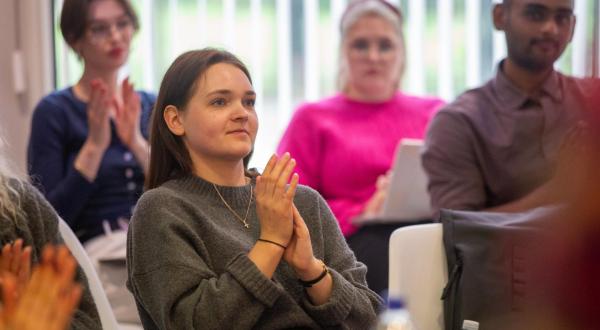Dissertation on Factors Associated with Adherence to Covid-19 Hygiene and Social Distancing Measures
Sanita Šuriņa, a doctoral student at Rīga Stradiņš University (RSU) and a lecturer at the RSU Department of Health Psychology and Pedagogy, developed her doctoral thesis during the Covid-19 pandemic. The aim was to investigate factors associated with Covid-19 preventive behaviour (adherence to hygiene and social distancing measures).
As the study was conducted in the dynamic and changing context of the Covid-19 pandemic, it was designed in two phases. The first phase, conducted in mid-2020, examined factors associated with Covid-19 preventive behaviour. The second phase, which was conducted in the second half of 2021, focused on specific factors associated with Covid-19 vaccination behaviour.
The study used data from a survey carried out within the framework of a National Research Programme project implemented by the Institute of Public Health: Impact of COVID-19 on health care system and public health in Latvia; ways in preparing health sector for future epidemics and data. The project was from a survey by the National Research Programme, Life with COVID-19: Evaluation of overcoming the coronavirus crisis in Latvia and recommendations for societal resilience in the future.
The results of the thesis revealed that trust in evidence-based information provided by the government, healthcare institutions, and the media about the dangers of Covid-19 and the importance of measures to limit its spread was an important factor influencing whether people complied with hygiene and social distancing measures and their attitudes towards vaccination. On the other hand, fear of contracting the disease and beliefs about the likelihood of contracting the disease appeared to be significant factors determining the adherence to hygiene and social distancing measures, but it is not related to vaccination against Covid-19. This could be explained by experiences during the pandemic, such as mild Covid-19 cases among acquaintances, creating the belief that Covid-19 is only dangerous for certain groups of people and thus changing the public perception of the dangers of Covid-19 and the initial fears.
The desire to protect oneself and others from becoming ill is an important motive for vaccination. The need to continue working and/or studying is also linked to getting vaccinated against Covid-19. Belief in Covid-19 conspiracy theories and social support from family members (the belief that support is available, if needed) can serve as deterrents to Covid-19 preventive behaviours.
The results of the study highlight the need to raise awareness in society that everyone can infect a large number of others through their actions, which can lead to illness and even death. The more aware a person is of the consequences of their actions, the more likely they are to follow recommendations for preventive behaviour.
Scientific supervisor: RSU Prof. Kristīne Mārtinsone
Sanita Šuriņa will defend her doctoral thesis "Factors Related to COVID-19 Preventive Behaviour in Population of Latvia" on 19 December.
Further information
Related news
 18 Student teams to start developing their ideas in B-Space incubation programmeFor RSU Employees, For Students, Innovation, B-Space
18 Student teams to start developing their ideas in B-Space incubation programmeFor RSU Employees, For Students, Innovation, B-Space


